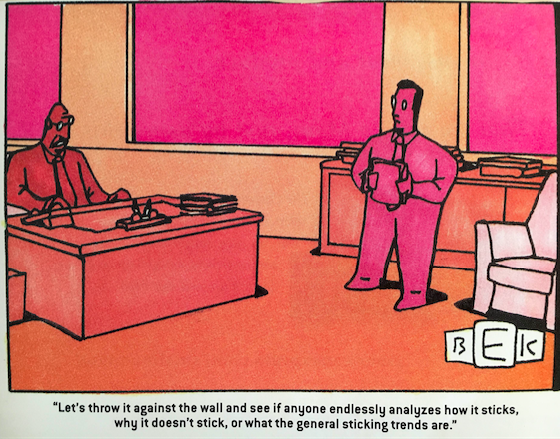Bureaucracy and Beaver Dams
There are so many organizations that are operating as glorified bureaucracies. Layers upon layers of control, measurement, and analysis clog the processes that they're supposed to support, and some of the highest paid people in those organizations aren't those actually doing the work - they're the ones analyzing the work.

With all of the levers and rules piling up in these organizations, it's no wonder people are running around feeling completely overwhelmed and foggy.
Bureaucracy corrupts.
It turns us into people who create more and more problems for ourselves so that we can stay busy and demonstrate how valuable we are. I want to share a quote from Ricardo Semler, who has an awesome TED Talk called "How to run a company with (almost) no rules."
Semler says, "Bureaucracies are built by and for people who busy themselves proving they are necessary, especially when they suspect they aren't."
Even if you don't identify as someone who creates busy-ness in order to prove that you're necessary, I'm sure you've met someone in this state. These are the people who talk about how busy and overwhelmed they are all the time, and I've been one of these people.
In my former worklife, I totally looked for more and more work in order to show how valuable I was. I made things overly complicated and did more for the sake of doing more, even though it rarely added value to the organization.
To demonstrate how ludicrous this is, I want to take a look at the natural world for a minute. Human beings are extremely complex thinkers, and we have these big brains that enable us to predict outcomes and analyze results, which has helped us to survive as long as we have. I would argue, however, that we have swung way too far in the direction of complexity.
While data is important and valuable, it is never more important than the quality of the work that's being done.
 Imagine a family of beavers building a new dam and lodge along a river. Do you think any of those beavers, once they've finished building their new home, is like "You know, I think we need to do a survey of other local beavers and build a report that demonstrates how fast beavers are building in this region. Maybe then we could compare it to reports from other regions and see how we compare!"
Imagine a family of beavers building a new dam and lodge along a river. Do you think any of those beavers, once they've finished building their new home, is like "You know, I think we need to do a survey of other local beavers and build a report that demonstrates how fast beavers are building in this region. Maybe then we could compare it to reports from other regions and see how we compare!"
Do you think that when bears gather food before they hibernate for winter, they look at what they've got and then go gather more just for the sake of seeing an increase in food stock year over year?
No!
In the animal world, simplicity reigns.
When the work is done, the work is done. Resources aren't wasted on reports or tasks that don't actually contribute to the well-being of the animal.
Nature purifies, and it holds a valuable lesson for people stuck in a state of overwhelm and bureaucracy.
 The next time you feel an urge to complain about how busy you are, I encourage you to pause and simply, lovingly, ask yourself: "Is what I feel busy with truly contributing any value?"
The next time you feel an urge to complain about how busy you are, I encourage you to pause and simply, lovingly, ask yourself: "Is what I feel busy with truly contributing any value?"
Are you busy with things that you believe contribute to the organization's higher purpose, or are you busy with things you're doing to try and prove your worth? What would happen if you just stopped doing those things? We often overestimate how much other people depend on the mundane tasks that we dread doing.
Now, to be fair, a lot of people are handed work and told it's necessary because it affects someone else down the bureaucracy chain. You may not feel like you have a lot of ownership over the work you're supposed to do, but that's not true.
You have more ownership than you know, and the seemingly infinite reports, measurements, and analysis will never stop coming until regular people in regular jobs start exposing them for the clutter that they are.
So what can you simplify today?
Can you stop once the dam and the lodge are built? Can you gather enough for the winter and then rest to enjoy the bounty? I hope you'll give yourself permission to try.
